Protesters Chant “Boycott MOCA” at Museum of Chinese in America Reopening
While visitors watched performances in the museum’s lobby, protesters pressed placards against the windows, chanting slogans like “Boycott MOCA” and “Chinatown is not for sale.”
by Hakim Bishara
July 14, 2021
July 14, 2021

Protesters calling to boycott the Museum of Chinese in America (MOCA) in New York for "complicity" in mass incarceration and gentrification (photo by Hakim Bishara for Hyperallergic)
After over a year of closure due to the COVID-19 pandemic, the Museum of Chinese in America (MOCA) reopened today, July 14, with a celebratory debut of the exhibition Responses: Asian American Voices Resisting the Tides of Racism. But while visitors inside were reflecting on artistic responses to Anti-Asian hate during the pandemic, about 100 protesters gathered outside the Chinatown museum and accused the institution itself of “racism.” They called to boycott the institution for “promoting displacement” of the same community that it wishes to represent.
While visitors were enjoying soothing musical and dance performances in the museum’s lobby, they could see the protesters pressing their placards against the windows and hear them chanting slogans like “Boycott MOCA” and “Chinatown is not for sale.” The protesters, who surrounded the museum’s main entrance at Centre Street, also booed guests who arrived at the opening, confronting them with the chant “Shame on you.”

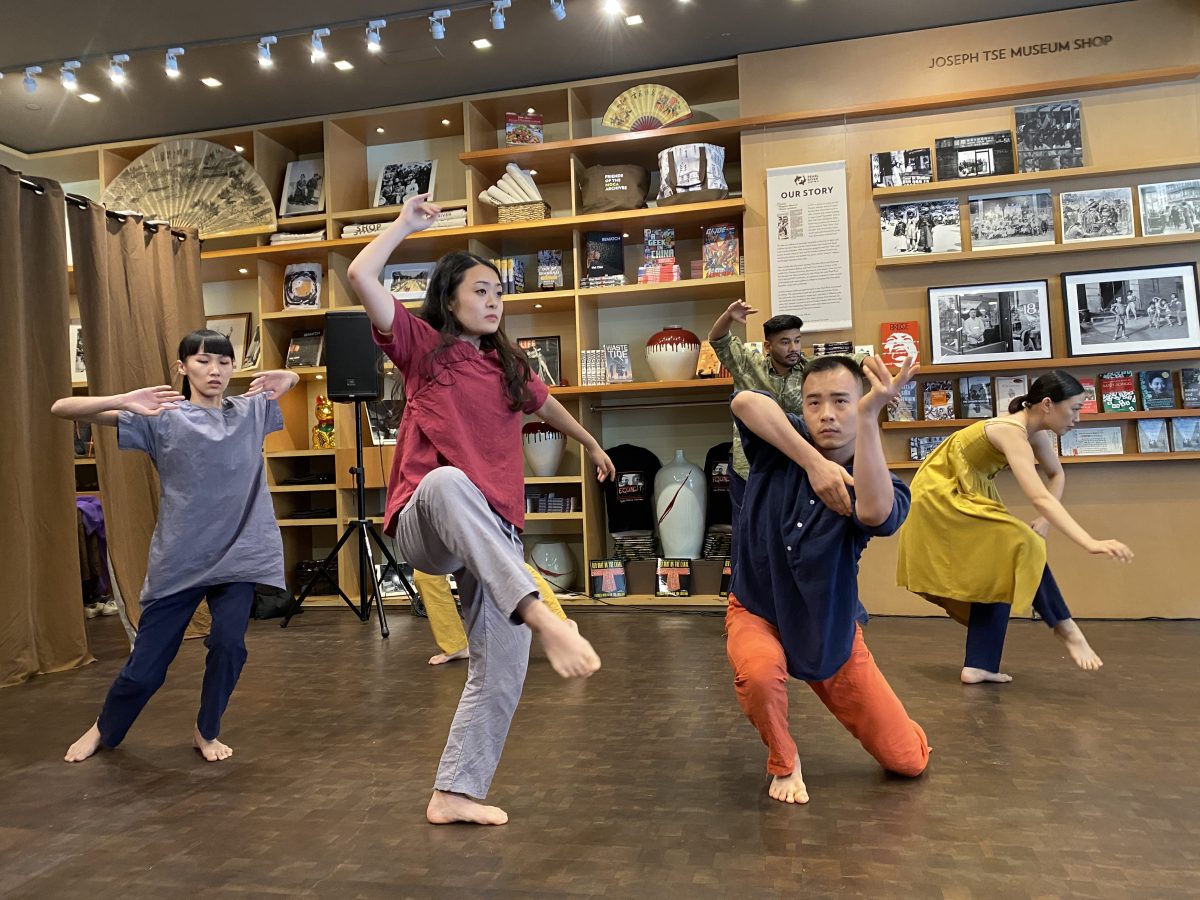
After over a year of closure due to the COVID-19 pandemic, the Museum of Chinese in America (MOCA) reopened today, July 14, with a celebratory debut of the exhibition Responses: Asian American Voices Resisting the Tides of Racism. But while visitors inside were reflecting on artistic responses to Anti-Asian hate during the pandemic, about 100 protesters gathered outside the Chinatown museum and accused the institution itself of “racism.” They called to boycott the institution for “promoting displacement” of the same community that it wishes to represent.
While visitors were enjoying soothing musical and dance performances in the museum’s lobby, they could see the protesters pressing their placards against the windows and hear them chanting slogans like “Boycott MOCA” and “Chinatown is not for sale.” The protesters, who surrounded the museum’s main entrance at Centre Street, also booed guests who arrived at the opening, confronting them with the chant “Shame on you.”

About 100 protesters gathered outside of MOCA during the reopening

A dance performance to celebrate the MOCA’s reopening after over a year of closure due to the COVID-19 pandemic
These jarring contrasts demonstrate the growing rift between the museum and grassroots organizations, including artist groups, in Chinatown. For months, these groups have been protesting against the museum’s acceptance of a $35 million concession as part of a jail expansion plan that would rehaul and expand an existing 15-story detention complex nearby. These funds were earmarked for a permanent home and performing arts space for MOCA, which suffered a devastating fire in its archive last year. The funds are part of a “community give-back” program included in Mayor Bill de Blasio’s plan to close the notorious Rikers Island jail complex and replace it with four borough-based detention centers across the city.
“They are trying to ignore us because they don’t want to admit to themselves that they are part of such a racist, hateful institution that uses the Asian-American community to prop itself up while beating it down at the same time,” said Jihye Simpkins, one of the protest’s organizers and a member of the Coalition to Protect Chinatown and the Lower East Side.
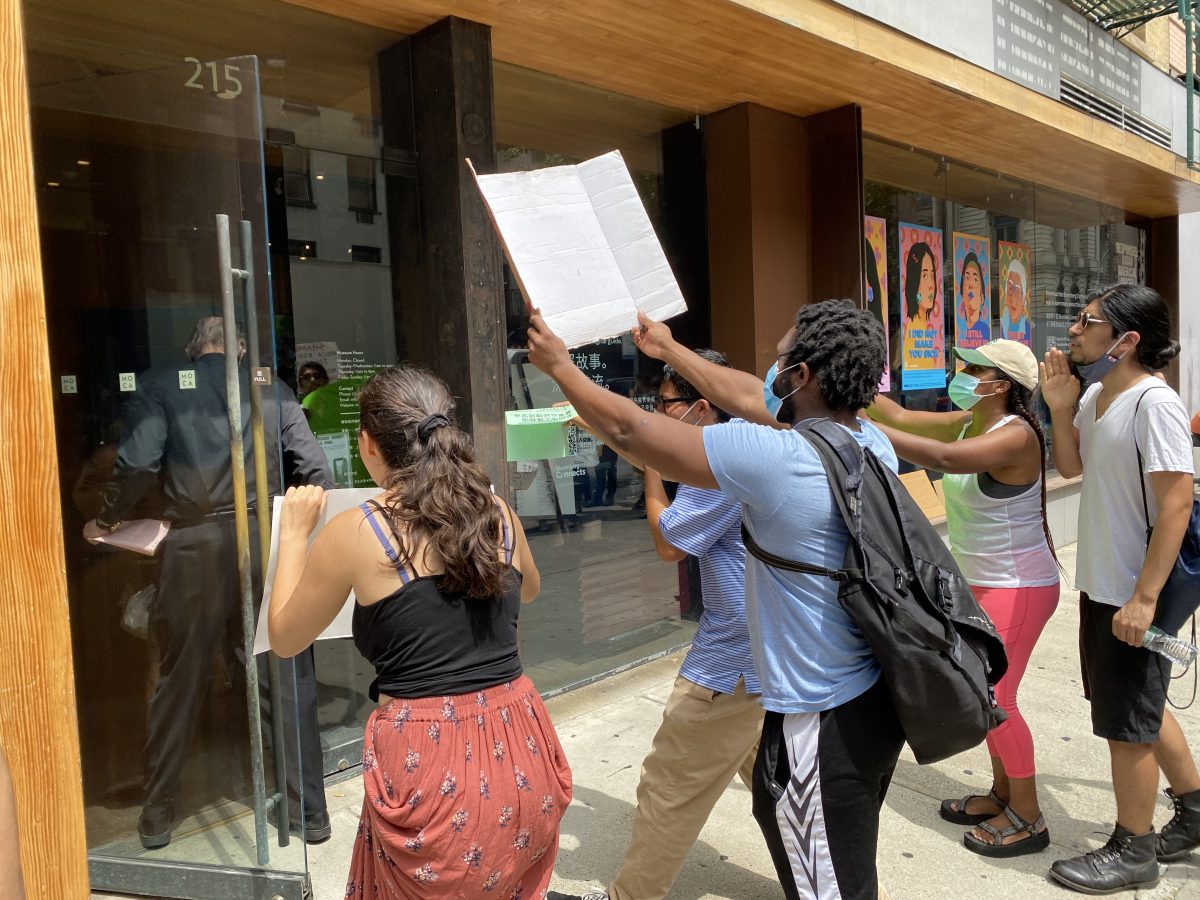
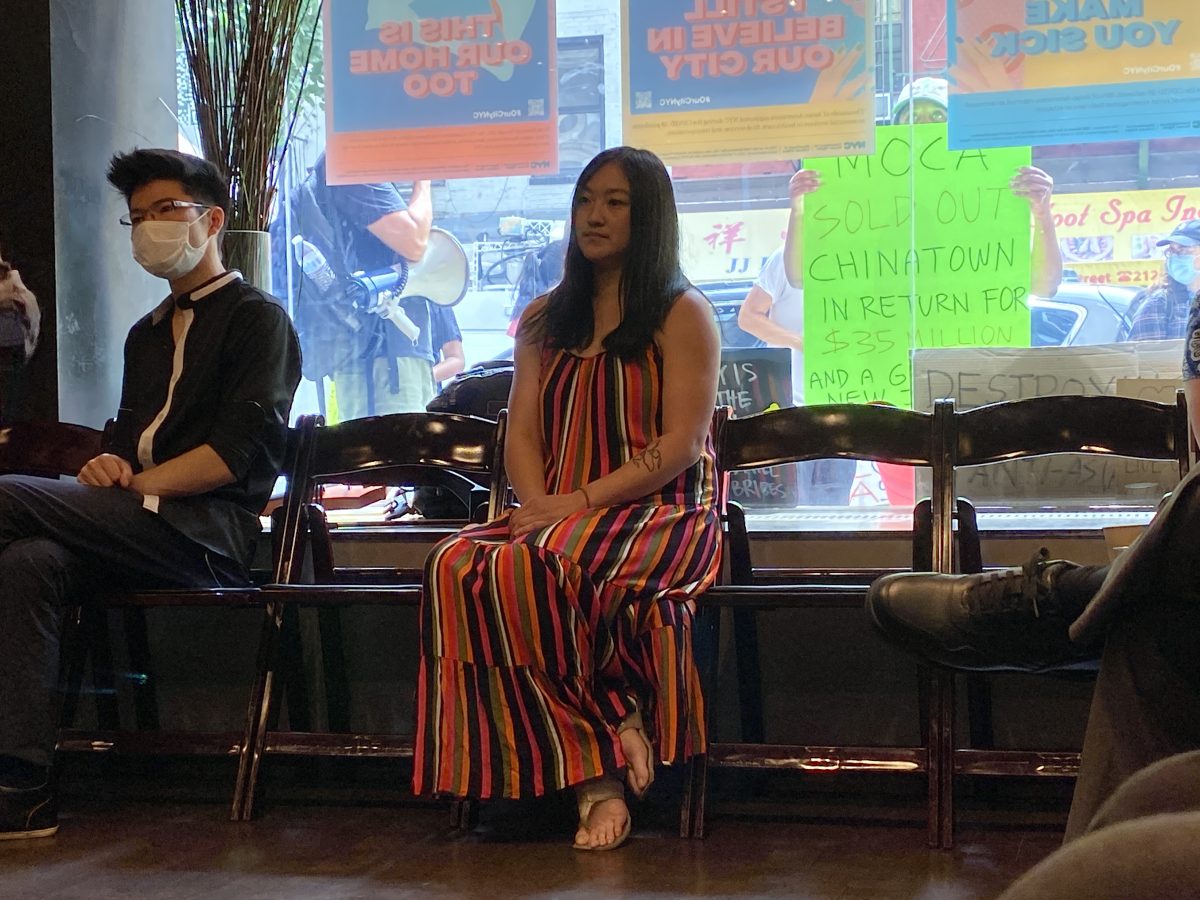
These jarring contrasts demonstrate the growing rift between the museum and grassroots organizations, including artist groups, in Chinatown. For months, these groups have been protesting against the museum’s acceptance of a $35 million concession as part of a jail expansion plan that would rehaul and expand an existing 15-story detention complex nearby. These funds were earmarked for a permanent home and performing arts space for MOCA, which suffered a devastating fire in its archive last year. The funds are part of a “community give-back” program included in Mayor Bill de Blasio’s plan to close the notorious Rikers Island jail complex and replace it with four borough-based detention centers across the city.
“They are trying to ignore us because they don’t want to admit to themselves that they are part of such a racist, hateful institution that uses the Asian-American community to prop itself up while beating it down at the same time,” said Jihye Simpkins, one of the protest’s organizers and a member of the Coalition to Protect Chinatown and the Lower East Side.

Protesters booed guests who arrived to the opening, confronting them with the chant “Shame on you.”

Protesters pressing their signs to MOCA’s windows during the reopening event
Among the most vocal opponents of the museum have been artists scheduled to go on view in the museum’s scheduled exhibitions.
On Monday, July 12, artists Colin Chin and Nicholas Liem sent a letter to MOCA requesting to withdraw their works from the museum’s collection and current exhibition, citing its “complicity” with mass incarceration and the gentrification of Chinatown. The artists’ withdrawn photo series depicts the Oakland Chinatown communities’ expressions of solidarity with Black Lives Matter protests last summer. During today’s protest, the two Bay Area artists delivered another message to the museum, read by the activist and architecture student Dorothy Qian.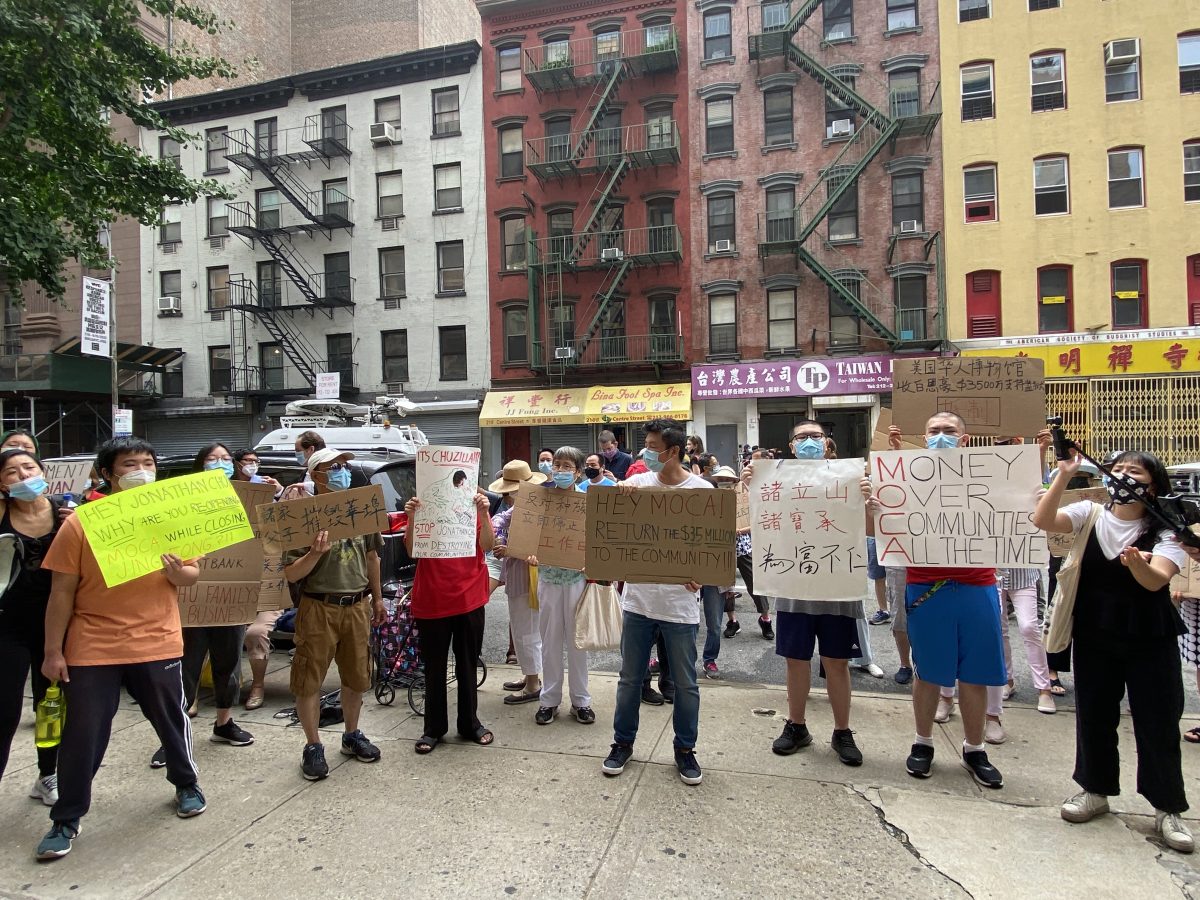

Among the most vocal opponents of the museum have been artists scheduled to go on view in the museum’s scheduled exhibitions.
On Monday, July 12, artists Colin Chin and Nicholas Liem sent a letter to MOCA requesting to withdraw their works from the museum’s collection and current exhibition, citing its “complicity” with mass incarceration and the gentrification of Chinatown. The artists’ withdrawn photo series depicts the Oakland Chinatown communities’ expressions of solidarity with Black Lives Matter protests last summer. During today’s protest, the two Bay Area artists delivered another message to the museum, read by the activist and architecture student Dorothy Qian.

For months, activist groups have been protesting against the museum’s acceptance of a $35 million concession as part of a jail expansion plan

Protesters carrying signs against Johanthan Chu, a real-estate mogul and MOCA’s co-chair, who’s accused of contributing to Chinatown’s gentrification
“With our photos showing murals of Angela Davis, Yuri Kochiyama and other social justice activists, we found MOCA’s actions and the title of the exhibition Responses: Asian American Voices Resisting the Tides of Racism to be hypocritical in the greatest sense,” Qian read from the artists’ statement. “It is because of this that we not only decided to pull our work from the show but to also raise awareness of the actions which were only recently known to us.”
In March of this year, citing similar reasons, 19 members of artist collective Godzilla withdrew from a retrospective of their work at MOCA, causing the museum to cancel the exhibition.
When first approached by Hyperallergic for comment during the opening event, MOCA’s president Nancy Yao Maasbach refused to comment, saying “You’re not my favorite person.” But in a written statement to Hyperallergic on Monday responding to Chin and Liem’s withdrawal from the exhibition, Yao Maasbach wrote: “MOCA has always been opponents of jail construction in Chinatown which we have made public, so it is unfortunate that the decision by these two artists to back out of MOCA’s new exhibit RESPONSES: Asian Americans Resisting the Tides of Racism has been guided by misinformation.”

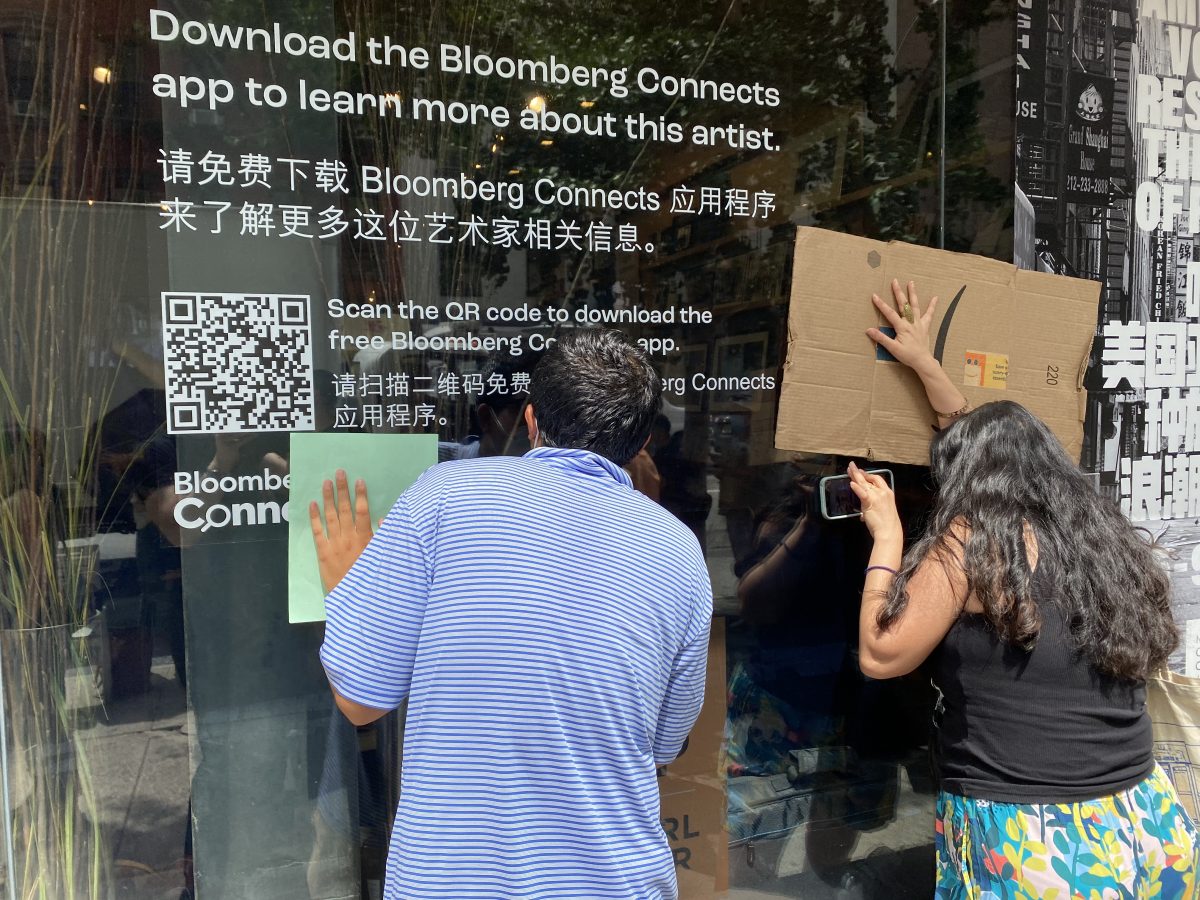
“With our photos showing murals of Angela Davis, Yuri Kochiyama and other social justice activists, we found MOCA’s actions and the title of the exhibition Responses: Asian American Voices Resisting the Tides of Racism to be hypocritical in the greatest sense,” Qian read from the artists’ statement. “It is because of this that we not only decided to pull our work from the show but to also raise awareness of the actions which were only recently known to us.”
In March of this year, citing similar reasons, 19 members of artist collective Godzilla withdrew from a retrospective of their work at MOCA, causing the museum to cancel the exhibition.
When first approached by Hyperallergic for comment during the opening event, MOCA’s president Nancy Yao Maasbach refused to comment, saying “You’re not my favorite person.” But in a written statement to Hyperallergic on Monday responding to Chin and Liem’s withdrawal from the exhibition, Yao Maasbach wrote: “MOCA has always been opponents of jail construction in Chinatown which we have made public, so it is unfortunate that the decision by these two artists to back out of MOCA’s new exhibit RESPONSES: Asian Americans Resisting the Tides of Racism has been guided by misinformation.”

Installation view of the exhibition Responses: Asian American Voices Resisting the Tides of Racism

Protesters pressing their signs against MOCA’s windows during the opening
To this, Simpkins countered: “MOCA says that they are opposed to the new jail but what are they doing to stop it? Accepting $35 million for the jail expansion plan is not opposition.”
Another major conflict between the museum and members of the Chinatown community revolves around Jonathan Chu, a real-estate mogul and co-chair of MOCA, whom the protesters accuse of contributing to the gentrification of the neighborhood. The activists claim that as the landlord of the restaurant Jing Fong, a 40-year-old staple in the community that shuttered in March, he declined pleas for rent forgiveness, leaving the restaurant with no other choice but to close its 800-seat location (the largest unionized restaurant in Chinatown) and relocate to a smaller space. In an email to Hyperallergic, a representative of Chu challenged these allegations, writing: “The owners of Jing Fong made the decision on their own to relocate their restaurant. Any suggestion otherwise is in direct conflict with what the Jing Fong owners have made clear themselves.”
Speaking with Hyperallergic in March, Claudia Leo, a spokesperson for Jing Fong, said that China Arcade LLC, the company owned by Chu, had “offered some rent relief” and explained that the closure was the result of plummeting revenue during the pandemic.
Since March, activists from the Coalition to Protect Chinatown and other groups have been protesting twice a week in front of one of Chu’s buildings in the neighborhood, requesting the reopening of Jing Fong’s banquet hall and the rehiring of about 180 laid-off workers.
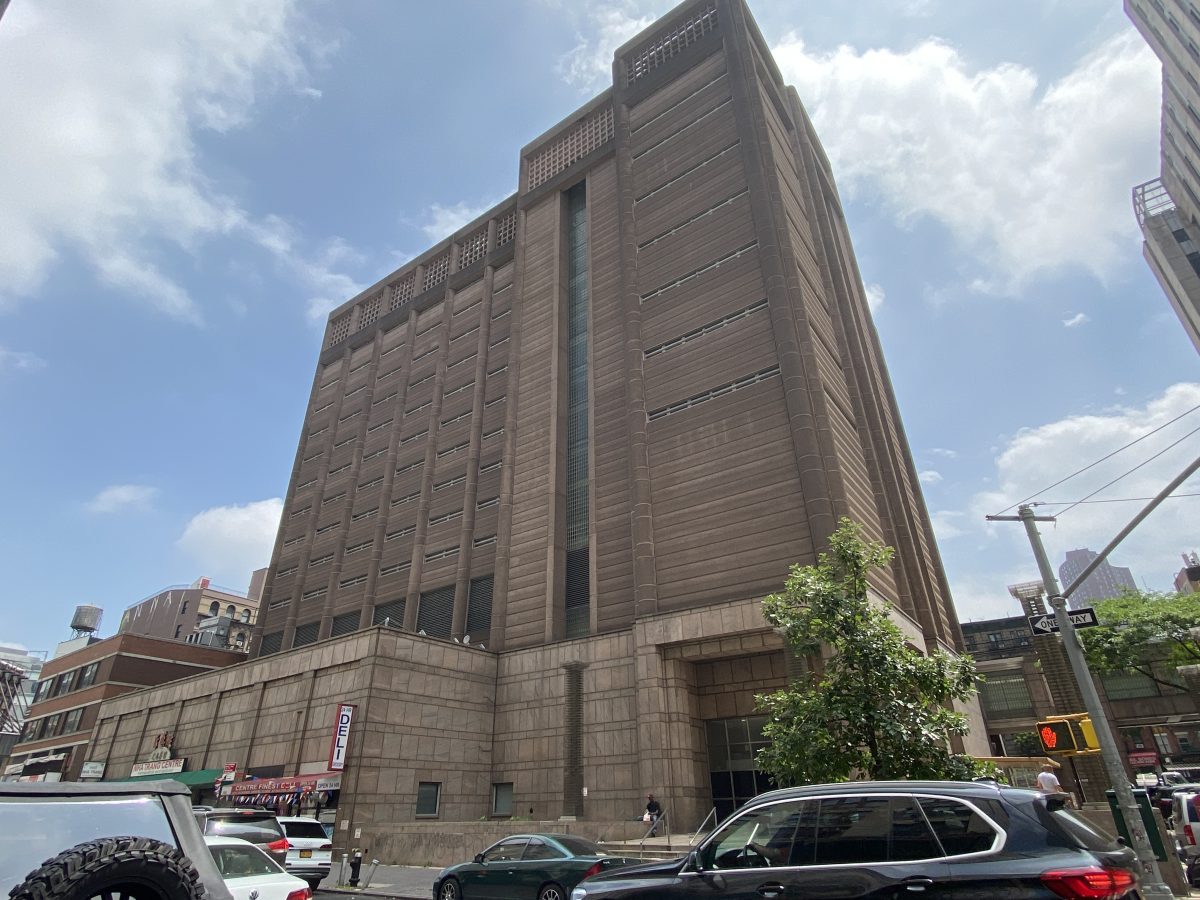
To this, Simpkins countered: “MOCA says that they are opposed to the new jail but what are they doing to stop it? Accepting $35 million for the jail expansion plan is not opposition.”
Another major conflict between the museum and members of the Chinatown community revolves around Jonathan Chu, a real-estate mogul and co-chair of MOCA, whom the protesters accuse of contributing to the gentrification of the neighborhood. The activists claim that as the landlord of the restaurant Jing Fong, a 40-year-old staple in the community that shuttered in March, he declined pleas for rent forgiveness, leaving the restaurant with no other choice but to close its 800-seat location (the largest unionized restaurant in Chinatown) and relocate to a smaller space. In an email to Hyperallergic, a representative of Chu challenged these allegations, writing: “The owners of Jing Fong made the decision on their own to relocate their restaurant. Any suggestion otherwise is in direct conflict with what the Jing Fong owners have made clear themselves.”
Speaking with Hyperallergic in March, Claudia Leo, a spokesperson for Jing Fong, said that China Arcade LLC, the company owned by Chu, had “offered some rent relief” and explained that the closure was the result of plummeting revenue during the pandemic.
Since March, activists from the Coalition to Protect Chinatown and other groups have been protesting twice a week in front of one of Chu’s buildings in the neighborhood, requesting the reopening of Jing Fong’s banquet hall and the rehiring of about 180 laid-off workers.

The Manhattan Detention Complex in Chinatown, New York, will be rehauled and expanded as part of the city’s jail expansion plan.
John Chen, a former worker at Jing Fong, was among the protesters today. He carried a sign in Chinese that read: “The Chu family, father and son, are destroying Chinatown.” In conversation with Hyperallergic, Chen said that he has been relying on unemployment benefits since the restaurant’s closure, unable to find a new job (activist Kai wen Yang assisted in translating the conversation).
“How can we continue to live in this city if we can’t find work?” Chen asked. “We are losing our neighborhood.”
The protesters are urging Chu to accept a plan proposed by former Jing Fong workers to buy the restaurant. Some, like Chin and Liem, also demand he be removed from MOCA’s board.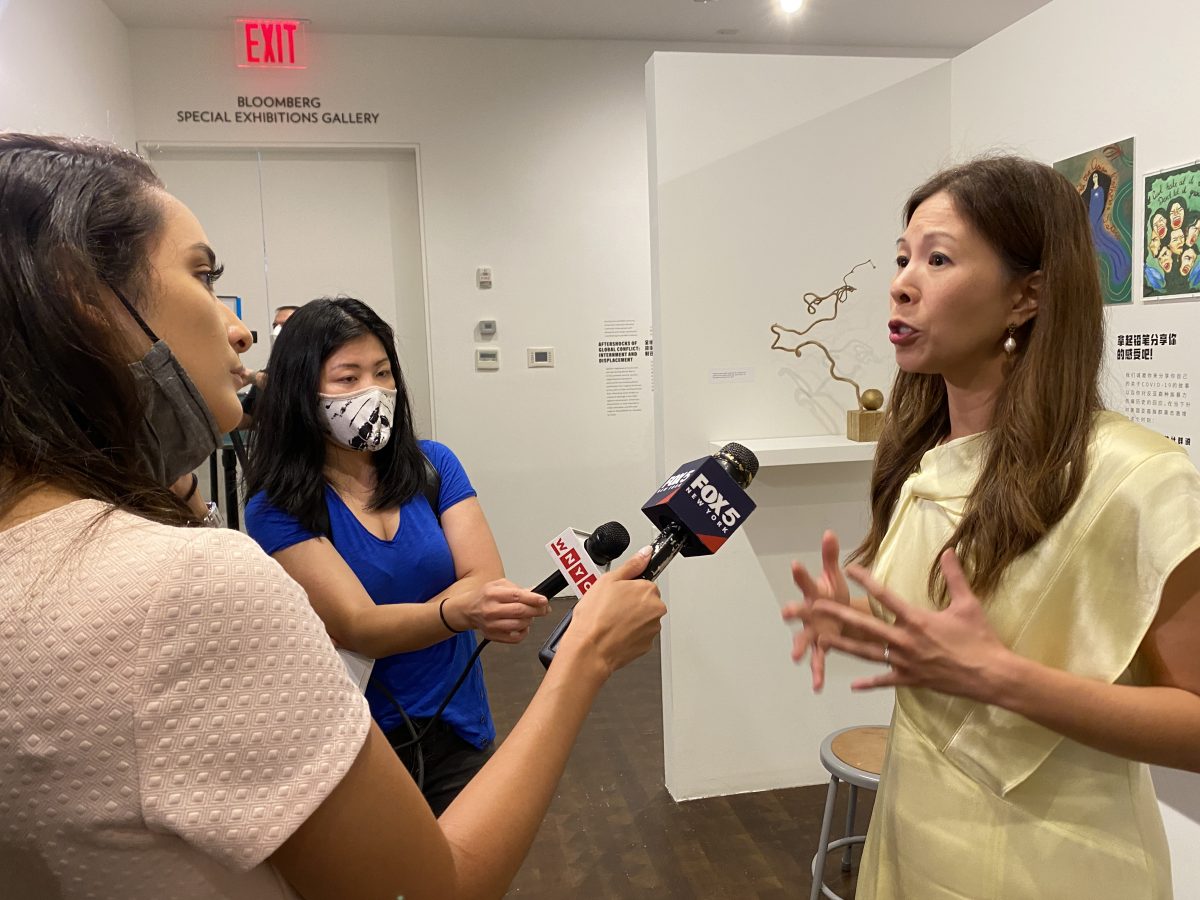
John Chen, a former worker at Jing Fong, was among the protesters today. He carried a sign in Chinese that read: “The Chu family, father and son, are destroying Chinatown.” In conversation with Hyperallergic, Chen said that he has been relying on unemployment benefits since the restaurant’s closure, unable to find a new job (activist Kai wen Yang assisted in translating the conversation).
“How can we continue to live in this city if we can’t find work?” Chen asked. “We are losing our neighborhood.”
The protesters are urging Chu to accept a plan proposed by former Jing Fong workers to buy the restaurant. Some, like Chin and Liem, also demand he be removed from MOCA’s board.

MOCA’s president Nancy Yao Maasbach speaking to the press at the reopening of the museum.
When approached again for comment, Yao Maasbach referred Hyperallergic to Henry S. Tang, an investment banker and friend of the museum who attended the reopening.
“The closing of the restaurant is an issue between the landlord and the tenant. It’s not related to MOCA,” Tang said. “MOCA was organized for the community 50 years ago. It’s not responsible for the gentrification of Chinatown; it’s responsible for the modernization of the area. Linking these issues capriciously is a disservice to the community. ”
Though emotions were running high, the protesters said that reconciliation with MOCA is possible if it opts to refuse the city’s $35 million grant or “give it back to the community.”
“We want that money back,” said Simpkins. “Chinatown was devastated by the pandemic and MOCA did nothing to help the community.”
Related
Museum of Chinese in America Should Reject “Jail Money,” Says Artist-Activist Group
October 1, 2020
Artists Request Museum of Chinese in America Remove Their Work From Its Collection
July 12, 2021
Art Workers Mobilize to Combat Anti-Asian Racism
May 21, 2020

Hakim Bishara
Hakim Bishara is a staff writer for Hyperallergic. He is also a co-director at Soloway Gallery, an artist-run space in Brooklyn. Bishara is a recipient of the 2019 Andy Warhol Foundation and Creative Capital Arts Writers Grant and he holds an... More by Hakim Bishara
When approached again for comment, Yao Maasbach referred Hyperallergic to Henry S. Tang, an investment banker and friend of the museum who attended the reopening.
“The closing of the restaurant is an issue between the landlord and the tenant. It’s not related to MOCA,” Tang said. “MOCA was organized for the community 50 years ago. It’s not responsible for the gentrification of Chinatown; it’s responsible for the modernization of the area. Linking these issues capriciously is a disservice to the community. ”
Though emotions were running high, the protesters said that reconciliation with MOCA is possible if it opts to refuse the city’s $35 million grant or “give it back to the community.”
“We want that money back,” said Simpkins. “Chinatown was devastated by the pandemic and MOCA did nothing to help the community.”
Related
Museum of Chinese in America Should Reject “Jail Money,” Says Artist-Activist Group
October 1, 2020
Artists Request Museum of Chinese in America Remove Their Work From Its Collection
July 12, 2021
Art Workers Mobilize to Combat Anti-Asian Racism
May 21, 2020
Hakim Bishara
Hakim Bishara is a staff writer for Hyperallergic. He is also a co-director at Soloway Gallery, an artist-run space in Brooklyn. Bishara is a recipient of the 2019 Andy Warhol Foundation and Creative Capital Arts Writers Grant and he holds an... More by Hakim Bishara
No comments:
Post a Comment